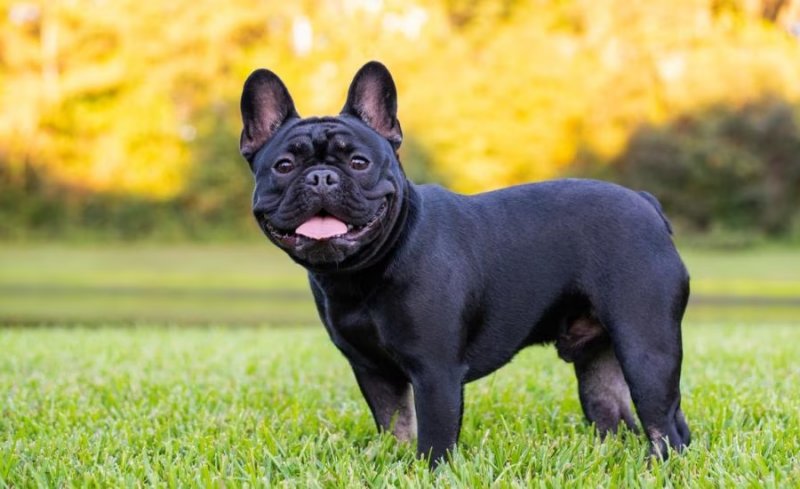The Ultimate Guide to IVDD in French Bulldogs
French Bulldogs and other dog breeds suffer from intervertebral disc disease (IVDD), a devastating spine illness. It causes intervertebral disc degeneration or herniation. Dogs with IVDD may experience pain, discomfort, and paralysis. Due to their body structure, French Bulldogs, noted for their cuteness and affection, are vulnerable to IVDD. Their small, stocky frame and stretched back stress their spine, making disc troubles more likely.
Every pet owner must understand IVDD and French Bulldogs. Early detection and treatment can greatly improve a dog’s quality of life. This detailed guide will discuss French Bulldog anatomy and physiology, including intervertebral discs and IVDD. Early detection of IVDD symptoms can avoid consequences.
We will discuss veterinary examination and imaging methods for IVDD diagnosis. We will also discuss treatment alternatives, from rest and medicine to hemilaminectomy or ventral slot surgeries.
Our pets need post-treatment care and rehabilitation to recover well. This period requires physical therapy, lifestyle changes, and emotional support. French Bulldog owners should consider food, activity, and surroundings to prevent IVDD. We’ll show you how to prevent IVDD in your French Bulldog’s spine.
IVDD also affects pets and their owners emotionally. Understanding your pet’s emotional well-being and comforting them during hard times is essential to their health. We’ll also discuss IVDD and breeding. Breeders can prevent this illness by understanding its genetics.
Anatomy and Physiology of French Bulldogs
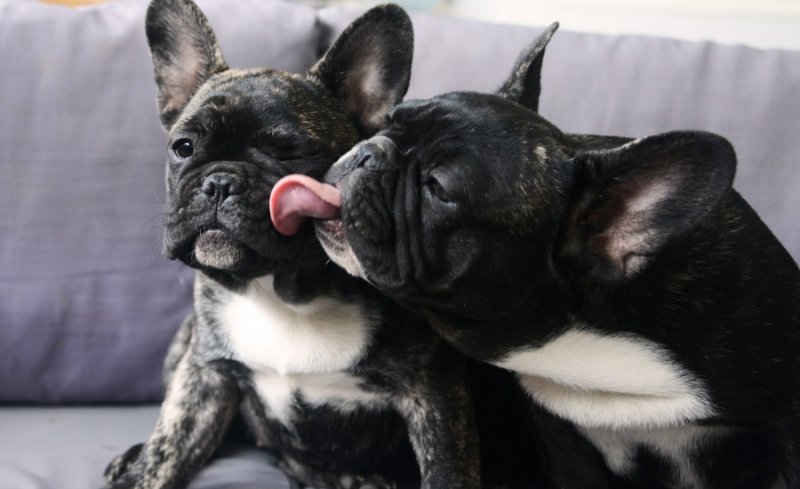
French Bulldogs’ unusual anatomy and lovely dispositions set them different from other dog breeds. Understanding their physical traits is crucial to understanding how IVDD affects their spinal health. French Bulldogs are short and stocky. Their compact size, deep chest, and well-muscled limbs make them strong companions. Despite their cuteness, their spine is vulnerable. French Bulldogs have vertebrae that protect the spinal cord in the spinal canal. Intervertebral discs cushion the spine and support movement between vertebrae. Intervertebral discs have a tough annulus fibrosus and a gel-like nucleus pulposus. These components help discs resist compression and distribute spine forces.
French Bulldogs’ distinctive body form puts more stress on their spines than canines with longer backs. Their small back and weight distribution can put pressure on their intervertebral discs, causing degeneration and herniation. Intervertebral Disc Disease occurs when these discs deteriorate or herniate, pressing on the spinal cord or nerves. In severe circumstances, compression can cause pain, weakness, and paralysis. French Bulldogs have brachycephaly, a short upper jaw. This gives them their charming “smushed” faces, but it can cause respiratory difficulties and damage their posture and balance.
French Bulldog owners must understand these physical differences and their repercussions. Understanding the spine’s structure, intervertebral discs, and body composition helps explain why IVDD is a major worry for this adorable species. Pet owners may protect their French Bulldogs’ spinal health by understanding their anatomy and physiology.
Types of IVDD in French Bulldogs
Intervertebral Disc Disease (IVDD) can manifest in different ways, and understanding the types of IVDD is crucial for effective management and treatment in French Bulldogs. Here are the main types of IVDD observed in this breed:
Disc Degeneration:
Disc degeneration occurs when the intervertebral discs in the spine naturally wear down with age. In French Bulldogs, the combination of their body structure and genetic predisposition can accelerate this degeneration, making them more susceptible to developing IVDD.
Disc Herniation:
Disc herniation is one of the most common forms of ivdd french bulldog. It happens when the gel-like inner core (nucleus pulposus) of an intervertebral disc pushes through its tough outer layer (annulus fibrosus) and compresses the spinal cord or nerves. This compression leads to pain, weakness, and potential paralysis.
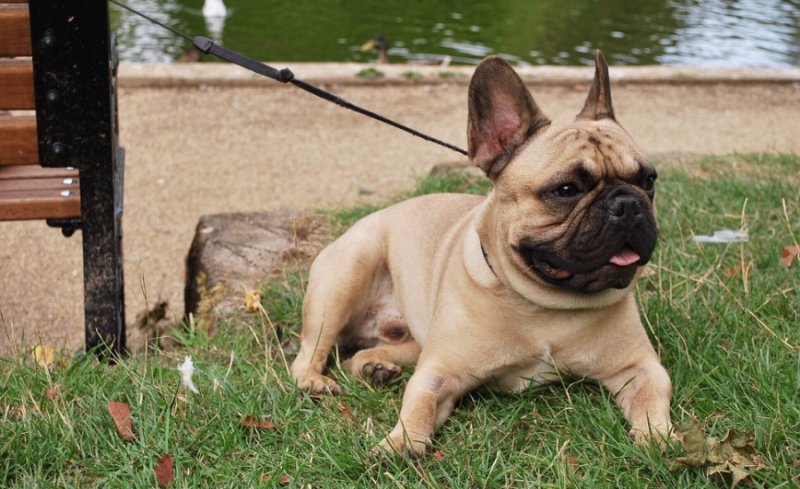
Hansen Type I Disc Disease:
Hansen Type I disc disease is a sudden and acute form of IVDD. It often occurs in younger French Bulldogs and involves the rapid extrusion of the nucleus pulposus into the spinal canal, leading to severe neurological symptoms. This type requires immediate medical attention.
Hansen Type II Disc Disease:
Hansen Type II disc disease is a more gradual and chronic form of IVDD. It involves a gradual degeneration of the intervertebral disc, leading to the development of bulging or protruding discs that can compress the spinal cord over time.
Other Variants and Related Conditions:
While disc degeneration and herniation are the primary types of ivdd french bulldog, there can be other variants and related conditions that affect the spine and cause similar symptoms. These may include bulging discs, slipped discs, or disc calcification.
Identifying the specific type of IVDD affecting a French Bulldog is crucial for determining the appropriate course of treatment and providing targeted care. Early detection and prompt intervention can significantly improve the outcome for our beloved furry companions. Regular veterinary check-ups and awareness of IVDD symptoms are essential for ensuring the well-being of French Bulldogs and giving them the best chance at a happy and healthy life.
Recognizing the Symptoms of IVDD
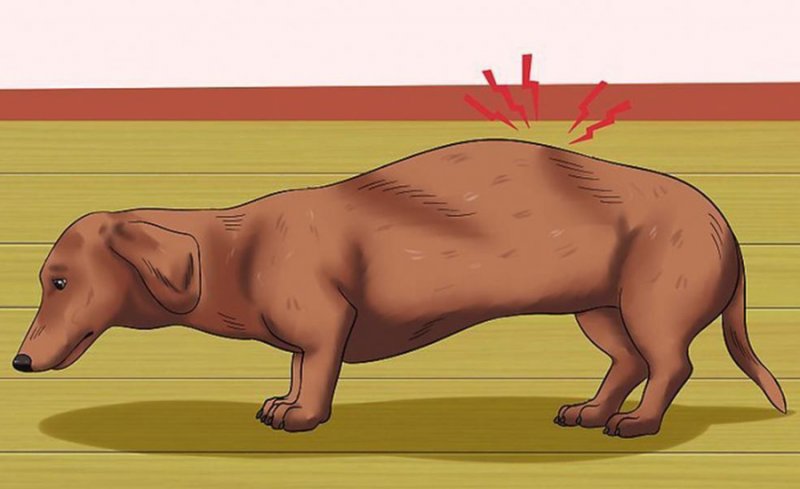
Early recognition of Intervertebral Disc Disease (IVDD) symptoms in French Bulldogs is vital for timely intervention and improved outcomes. Here are some key signs to watch out for:
Back Pain and Stiffness:
One of the primary indicators of IVDD is back pain and stiffness. If your French Bulldog shows discomfort while moving, yelps when touched in certain areas, or appears reluctant to jump or climb, it could be a sign of spinal issues.
Difficulty Walking and Weakness:
IVDD can affect a dog’s ability to walk properly. If you notice your French Bulldog stumbling, dragging their paws, or showing weakness in their hind legs, it could be due to nerve compression caused by herniated discs.
Hunched Posture and Arched Back:
Dogs with IVDD may adopt a hunched posture or have an arched back, indicating pain and discomfort in the spinal region.
Lameness in One or Both Legs:
IVDD can lead to lameness in one or both of your French Bulldog’s legs. They may limp or have difficulty bearing weight on the affected limb.
Loss of Coordination and Balance:
As IVDD progresses, dogs may exhibit a loss of coordination and balance. They may have trouble maintaining their balance, leading to stumbling and falling.
Reluctance to Move or Play:
French Bulldogs with IVDD might become less active and exhibit reluctance to engage in physical activities or play.
Muscle Atrophy:
Long-term IVDD can lead to muscle atrophy (wasting) in the affected limbs due to reduced nerve function.
Loss of Bladder and Bowel Control:
In severe cases, IVDD can cause loss of bladder and bowel control, indicating significant spinal cord compression.
If you notice any of these symptoms in your French Bulldog, it is essential to seek immediate veterinary attention. Early diagnosis and appropriate treatment can prevent further progression of IVDD and help your furry friend on the path to recovery. Remember, each dog may exhibit symptoms differently, so being attentive to any changes in behavior or mobility is crucial for their well-being.
Diagnosing IVDD in French Bulldogs
Diagnosing Intervertebral Disc Disease ivdd french bulldog involves a thorough veterinary examination and a combination of clinical signs and diagnostic tests. When you suspect IVDD or notice any symptoms related to spinal issues in your French Bulldog, the first step is to consult a veterinarian. During the examination, the vet will take a detailed medical history, inquire about the onset and progression of symptoms, and perform a physical assessment of your dog’s mobility and pain response.
To confirm the diagnosis and determine the severity of IVDD, the veterinarian may recommend various imaging techniques. X-rays are often the initial choice to assess the spinal alignment and look for any bony changes or calcifications. X-rays may not reveal soft tissues like intervertebral discs. MRI or CT scans are used in such circumstances. These imaging methods can reveal intervertebral discs and spinal cord or nerve problems.
Additionally, the veterinarian will perform neurological tests to assess your French Bulldog’s reflexes, sensitivity to touch, and limb strength. These tests can help determine the extent of neurological impairment and provide valuable insights into the severity of IVDD.
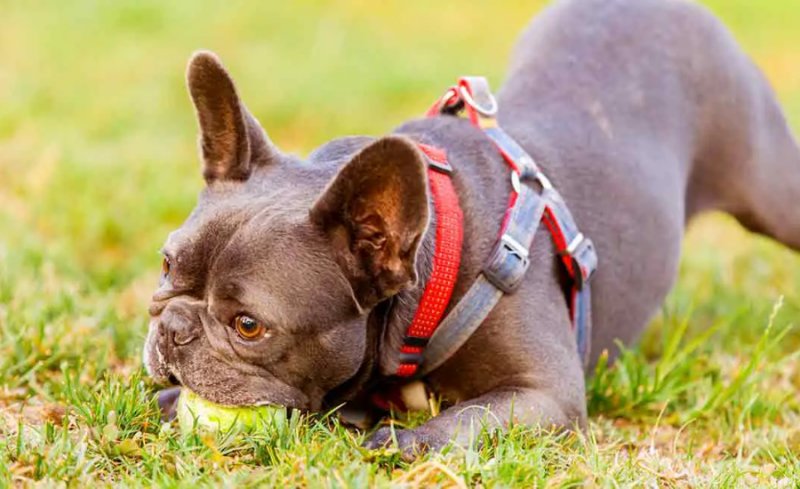
It is crucial to differentiate IVDD from other possible causes of similar symptoms. Some conditions, such as spinal tumors or infections, can mimic IVDD symptoms. The veterinarian will perform differential diagnoses to rule out other potential underlying issues.
The combination of the physical examination, medical history, imaging tests, and neurological evaluations will allow the veterinarian to reach a definitive diagnosis of IVDD. After diagnosis, therapy might range from rest and medication to surgery in extreme situations. Your French Bulldog’s health and well-being depend on early detection and precise diagnosis.
Treatment Options for IVDD
French Bulldogs’ IVDD treatment choices depend on severity. Conservative management may be advised for moderate symptoms or early IVDD. To relieve spinal disc pressure, the injured dog is restrained. Rest, pain treatment, and anti-inflammatory drugs can reduce inflammation.
IVDD that causes nerve compression or paralysis may require surgery. Hemilaminectomy and ventral slot treatments relieve spinal cord and nerve pressure caused by herniated discs.
Recovery requires post-treatment care and rehabilitation. Physical therapy and rehabilitation can help your French Bulldog recover from surgery or conservative treatment. Rehabilitation exercises prevent muscle atrophy and improve spinal health.
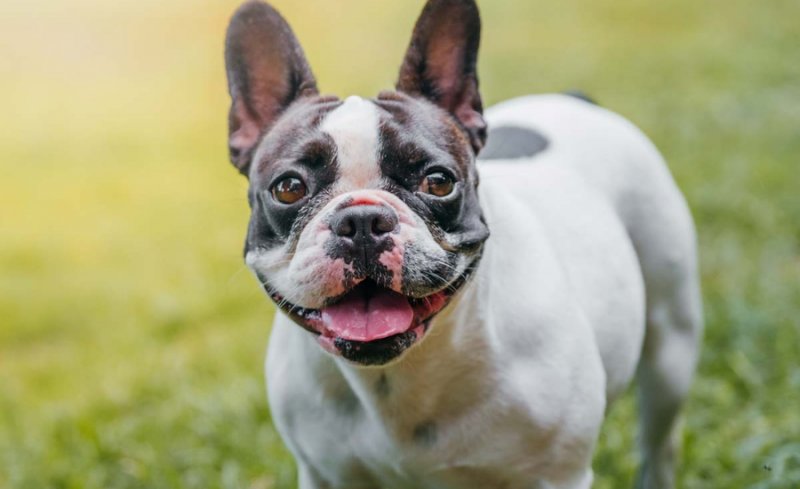
Lifestyle changes can help manage IVDD long-term. To prevent jumping, French Bulldog owners may need to use ramps instead of steps. A supportive bed or crate can also help them heal.
Your French Bulldog’s treatment must be closely monitored. The vet can change the treatment strategy based on the dog’s response at follow-up sessions.
Work with your vet to find the best treatment for your French Bulldog’s ailment. IVDD dogs benefit from prompt and adequate therapy.
Post-Treatment Care and Rehabilitation
French Bulldogs with IVDD benefit from post-treatment care and rehabilitation. Helping the dog recover from surgery or conservative care is crucial. Post-treatment physical therapy improves muscle tone, coordination, and flexibility. Your French Bulldog’s exercises will be customized.
Balance, underwater treadmill, and stretching activities may aid rehabilitation. These exercises develop muscle, minimize injury risk, and promote spinal health.
Besides physical therapy, a supportive and comfortable setting is crucial throughout recuperation. A soft orthopedic bed or crate relieves spine pressure and helps control pain. Ramps instead of stairs help reduce spine strain in dogs with restricted mobility.
Pain and inflammatory drugs may be prescribed after treatment. To maximize recovery, follow the veterinarian’s dosage and administration instructions.
You’re crucial to your French Bulldog’s rehabilitation. Watching their improvement is crucial. Be patient and helpful while they recuperate.
Progress can be assessed and the recovery strategy adjusted during regular vet appointments. Your veterinarian will create a customized post-treatment care and rehabilitation regimen for your French Bulldog to ensure the best possible outcome and a return to an active and happy life.
Emotional Support for Dogs with IVDD
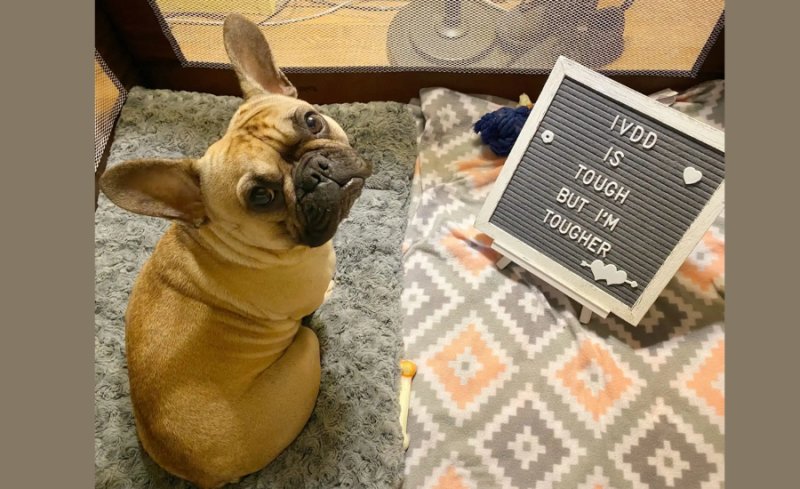
French Bulldog owners and their dogs often struggle emotionally with Intervertebral Disc Disease (IVDD). The affected dog needs emotional assistance during this trying period.
Understanding Canine Emotional Well-being:
Dogs have feelings like humans. IVDD-related pain, discomfort, or movement may cause anxiety, tension, or fear. Owners can show empathy and patience by understanding their emotions.
Coping with IVDD-related Anxiety:
Dogs with IVDD may develop anxiety due to their changed circumstances or discomfort. Maintaining a calm and reassuring environment can help alleviate their anxiety. Spending quality time with your French Bulldog, engaging in gentle play or simply offering a comforting presence, can have a positive impact on their emotional state.
The Role of Pet Owners in Providing Comfort:
As an owner, your presence and support are invaluable to your French Bulldog’s emotional well-being. Offering gentle affection and talking to your dog in soothing tones can help them feel secure and loved during their recovery journey.
Adapting Activities for Emotional Comfort:
While physical activities may be limited during the recovery period, finding alternative ways to stimulate your French Bulldog mentally can be beneficial. Puzzle toys, interactive games, and gentle mental exercises can keep their minds engaged and contribute to their emotional comfort.
Patience and Encouragement:
Recovering from IVDD can be a gradual process, and your French Bulldog may face ups and downs along the way. Demonstrating patience and offering words of encouragement can boost their confidence and overall emotional well-being.
Seeking Professional Support:
Consult a physician or animal behaviorist if your dog shows recurrent anxiety or emotional discomfort. They can help you support your dog’s emotions.
Remember that your bond with your French Bulldog plays a significant role in their emotional recovery. Providing unconditional love, reassurance, and a nurturing environment can help your pet navigate the challenges of ivdd french bulldog with a sense of security and comfort.
Living with a French Bulldog with IVDD
Living with a French Bulldog with Intervertebral Disc Disease (IVDD) needs compassion, adaptation, and a dedication to providing the finest treatment. Your French Bulldog’s health depends on understanding IVDD and adapting your daily routine.
Owners must observe their dogs’ symptoms and behavior. Check for pain and activity levels. You can quickly respond to changes in their condition and seek veterinarian care with this alertness.
Safety and assistance are crucial. Make your home safer, especially during rehabilitation. Give your dog a comfy, easy-to-access sleeping area, and consider using ramps instead of steps to avoid back strain.
ivdd french bulldog need relaxation and exercise. Follow your vet’s activity limitations and give your dog enough rest to recover.

Additionally, French Bulldogs need emotional support. IVDD affects dogs emotionally, so give them lots of love, attention, and reassurance. Play with your dog gently and mindfully.
Health depends on a balanced diet. Consult your vet to verify your French Bulldog’s feed supports recuperation and weight management.
Expect IVDD recurrence. Knowing the indicators of relapses might help you act quickly and get veterinarian care.
Living with a ivdd french bulldog demands tolerance, understanding, and a willingness to change your routines. Your love, care, and attention can help your animal friend cope with IVDD and live a happy and comfortable life.
IVDD and Breeding Practices
Intervertebral Disc Disease (IVDD) has implications for breeding practices, especially in French Bulldogs. Responsible breeding is essential to reduce the risk of passing on genetic predispositions for IVDD to future generations.
Given the distinctive structure of some dog breeds, especially French Bulldogs, IVDD has been related to genetic factors and is more common in such breeds. Breeding dogs with IVDD or a family history increases the risk of genetic vulnerability.
Breeders take care of their dogs and puppies. They conduct thorough health screenings and genetic tests to identify potential carriers of IVDD or other hereditary diseases before breeding. Dogs with a history of IVDD or those showing signs of the condition are excluded from breeding programs to minimize the risk of passing on the genetic predisposition.
Breeders can gradually lower the prevalence of IVDD in the breed over time by engaging in selective breeding. Furthermore, it is essential to keep lines of communication open within the breeding community regarding the significance of ethical breeding and genetic testing in order to spread awareness and encourage good breeding practices.
Future generations of French Bulldogs will be less likely to contract IVDD and other inherited diseases because of responsible breeding procedures, which help improve the breed’s overall health and longevity. Making educated decisions and advancing the health of the breed depends on cooperation between breeders, veterinarians, and breed groups.
People Also Ask (FAQs)
Can IVDD be completely cured in French Bulldogs?
ivdd french bulldog can be treated, however, it may not be totally cured. The disease’s severity, disc location, and the dog’s response to treatment determine the result. Early detection and prompt intervention can significantly improve the chances of a positive outcome and enhanced quality of life for affected French Bulldogs.
Are there any home remedies for managing IVDD symptoms?
Home remedies should not replace professional veterinary care for IVDD. While providing a supportive and comfortable environment is essential, attempting home remedies without proper guidance can be risky. It is crucial to consult with a veterinarian for a comprehensive treatment plan tailored to your French Bulldog’s specific condition. Following their recommendations for medications, physical therapy, and lifestyle adjustments will yield the best results.
How can I prevent IVDD in my French Bulldog?
Preventing IVDD in French Bulldogs involves a combination of responsible breeding practices and lifestyle choices. Responsible breeders test their dogs for IVDD and other inherited disorders. As a pet owner, eating well, exercising, and avoiding back-straining activities can lower IVDD risk. For early intervention, regular veterinary checkups and early symptom diagnosis are necessary.
What should I do if I suspect my French Bulldog has IVDD?
If you suspect your French Bulldog has IVDD or notice any signs of back pain, weakness, or mobility issues, seek immediate veterinary attention. A veterinarian will perform a thorough examination, which may include imaging tests to diagnose IVDD accurately. Early diagnosis and treatment improve recovery odds.
Is it safe to breed a French Bulldog with a history of IVDD?
IVDD-afflicted French Bulldogs should not be bred. Responsible breeders put their breeding canines’ health first. IVDD-prone dogs can pass on their genetic propensity to their progeny. To ensure breed health, collaborate with reputable breeders who focus on genetic testing and appropriate breeding.
Stay in touch to get more updates & alerts on Hint! Thank you

